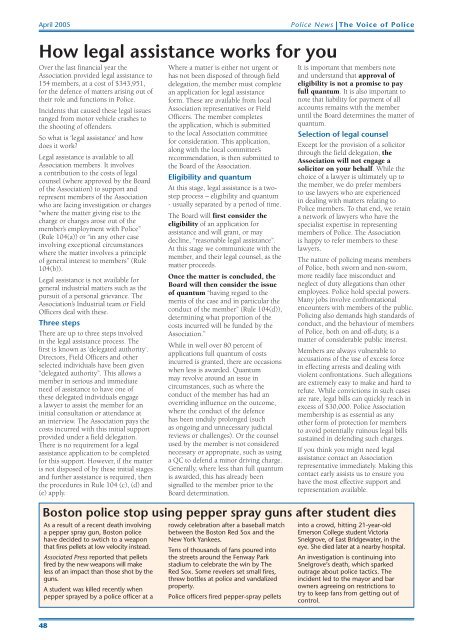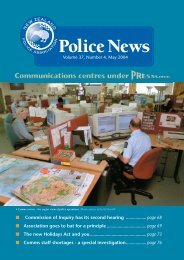<strong>April</strong> 2005<strong>Police</strong> <strong><strong>New</strong>s</strong> The Voice of <strong>Police</strong>How legal assistance works for youOver the last financial year the<strong>Association</strong> provided legal assistance to154 members, at a cost of $343,951,for the defence of matters arising out oftheir role and functions in <strong>Police</strong>.Incidents that caused these legal issuesranged from motor vehicle crashes tothe shooting of offenders.So what is ‘legal assistance’ and howdoes it work?Legal assistance is available to all<strong>Association</strong> members. It involvesa contribution to the costs of legalcounsel (where approved by the Boardof the <strong>Association</strong>) to support andrepresent members of the <strong>Association</strong>who are facing investigation or charges“where the matter giving rise to thecharge or charges arose out of themember’s employment with <strong>Police</strong>”(Rule 104(a)) or “in any other caseinvolving exceptional circumstanceswhere the matter involves a principleof general interest to members” (Rule104(b)).Legal assistance is not available forgeneral industrial matters such as thepursuit of a personal grievance. The<strong>Association</strong>’s Industrial team or FieldOfficers deal with these.Three stepsThere are up to three steps involvedin the legal assistance process. Thefirst is known as ‘delegated authority’.Directors, Field Officers and otherselected individuals have been given“delegated authority”. This allows amember in serious and immediateneed of assistance to have one ofthese delegated individuals engagea lawyer to assist the member for aninitial consultation or attendance atan interview. The <strong>Association</strong> pays thecosts incurred with this initial supportprovided under a field delegation.There is no requirement for a legalassistance application to be completedfor this support. However, if the matteris not disposed of by these initial stagesand further assistance is required, thenthe procedures in Rule 104 (c), (d) and(e) apply.Where a matter is either not urgent orhas not been disposed of through fielddelegation, the member must completean application for legal assistanceform. These are available from local<strong>Association</strong> representatives or FieldOfficers. The member completesthe application, which is submittedto the local <strong>Association</strong> committeefor consideration. This application,along with the local committee’srecommendation, is then submitted tothe Board of the <strong>Association</strong>.Eligibility and quantumAt this stage, legal assistance is a twostepprocess – eligibility and quantum- usually separated by a period of time.The Board will first consider theeligibility of an application forassistance and will grant, or maydecline, “reasonable legal assistance”.At this stage we communicate with themember, and their legal counsel, as thematter proceeds.Once the matter is concluded, theBoard will then consider the issueof quantum “having regard to themerits of the case and in particular theconduct of the member” (Rule 104(d)),determining what proportion of thecosts incurred will be funded by the<strong>Association</strong>.”While in well over 80 percent ofapplications full quantum of costsincurred is granted, there are occasionswhen less is awarded. Quantummay revolve around an issue incircumstances, such as where theconduct of the member has had anoverriding influence on the outcome,where the conduct of the defencehas been unduly prolonged (suchas ongoing and unnecessary judicialreviews or challenges). Or the counselused by the member is not considerednecessary or appropriate, such as usinga QC to defend a minor driving charge.Generally, where less than full quantumis awarded, this has already beensignalled to the member prior to theBoard determination.It is important that members noteand understand that approval ofeligibility is not a promise to payfull quantum. It is also important tonote that liability for payment of allaccounts remains with the memberuntil the Board determines the matter ofquantum.Selection of legal counselExcept for the provision of a solicitorthrough the field delegation, the<strong>Association</strong> will not engage asolicitor on your behalf. While thechoice of a lawyer is ultimately up tothe member, we do prefer membersto use lawyers who are experiencedin dealing with matters relating to<strong>Police</strong> members. To that end, we retaina network of lawyers who have thespecialist expertise in representingmembers of <strong>Police</strong>. The <strong>Association</strong>is happy to refer members to theselawyers.The nature of policing means membersof <strong>Police</strong>, both sworn and non-sworn,more readily face misconduct andneglect of duty allegations than otheremployees. <strong>Police</strong> hold special powers.Many jobs involve confrontationalencounters with members of the public.Policing also demands high standards ofconduct, and the behaviour of membersof <strong>Police</strong>, both on and off-duty, is amatter of considerable public interest.Members are always vulnerable toaccusations of the use of excess forcein effecting arrests and dealing withviolent confrontations. Such allegationsare extremely easy to make and hard torefute. While convictions in such casesare rare, legal bills can quickly reach inexcess of $30,000. <strong>Police</strong> <strong>Association</strong>membership is as essential as anyother form of protection for membersto avoid potentially ruinous legal billssustained in defending such charges.If you think you might need legalassistance contact an <strong>Association</strong>representative immediately. Making thiscontact early assists us to ensure youhave the most effective support andrepresentation available.Boston police stop using pepper spray guns after student diesAs a result of a recent death involvinga pepper spray gun, Boston policehave decided to swtich to a weaponthat fires pellets at low velocity instead.Associated Press reported that pelletsfired by the new weapons will makeless of an impact than those shot by theguns.A student was killed recently whenpepper sprayed by a police officer at arowdy celebration after a baseball matchbetween the Boston Red Sox and the<strong>New</strong> York Yankees.Tens of thousands of fans poured intothe streets around the Fenway Parkstadium to celebrate the win by TheRed Sox. Some revelers set small fires,threw bottles at police and vandalizedproperty.<strong>Police</strong> officers fired pepper-spray pelletsinto a crowd, hitting 21-year-oldEmerson College student VictoriaSnelgrove, of East Bridgewater, in theeye. She died later at a nearby hospital.An investigation is continuing intoSnelgrove’s death, which sparkedoutrage about police tactics. Theincident led to the mayor and barowners agreeing on restrictions totry to keep fans from getting out ofcontrol.48
<strong>New</strong> <strong>Zealand</strong> <strong>Police</strong> <strong>Association</strong><strong>April</strong> 2005Delays in PCA investigations causing stress for membersBy Steve Plowman, Editor, <strong>Police</strong> <strong><strong>New</strong>s</strong>Imagine the outcry if a defendant in acriminal case had to wait several yearsbefore a judge or jury determined theirguilt or innocence.Imagine how stressful that would be ifyou were the defendant.Defence lawyers would no doubt bearguing unnecessary delay under the Billof Rights, which states that an accusedperson has the right to be tried without“undue delay”. In several cases, defencelawyers have asked the court to dismisscharges against their client on this basis.Last year, several defence lawyers saidthat they were looking at testing the Billof Rights “undue delay” interpretationfor clients who were facing charges ofmanufacturing methamphetamine butwho had not had their day in court due toESR testing backlogs.But, at the same time, some police officersfacing allegations, which have become thesubject of PCA investigations, have beenwaiting several years to hear whether theywill face disciplinary action.Stressful time<strong>Police</strong> officers faced with such accusationsknow only too well that it could costthem their jobs and, not surprisingly, it isa stressful time for them and their familieswhile they await the outcome. Membershave complained to the <strong>Association</strong>that stress is being compounded byunacceptable delays in the investigationprocess.The concept under which the PCA operatesis that it should act independently inperforming its statutory functions andduties. Yet, the reality is that the PCA isunwilling to make a determination onmatters still before other agencies (e.g.criminal or civil court action or a Coroner’sinquest). Some members have expressed aconcern that this makes the PCA look as if itis “riding on the coat tails of other agencies”.The perfect example of such delays is thepolice shooting of Stephen Wallace atWaitara in 2001. The PCA’s determinationon complaints against the police officerinvolved, despite the fact that the officer wasfound not guilty in a private prosecutiontaken by the Wallace family, is still held uppending a Coroner’s inquiry.Overly cautious approachThe <strong>Police</strong> <strong>Association</strong> views thisapproach as being overly cautiousand a contributing factor in long andunnecessary delays. The <strong>Association</strong> isaware of cases dating back several years,which the PCA is yet to report on. Onerelates to an allegation made in 1999.Section 30 of the <strong>Police</strong> ComplaintsAuthority Act (1988) says that theAuthority must “conduct the investigationwith due expedition”.In his Annual Report, the Authority,Judge Ian Borrin, makes reference to thedifficulty of ensuring what he terms “thetimely disposal of complaints”.Judge Borrin goes on to report that:“As most complaints continue to beinvestigated by the <strong>Police</strong> in the districtwhere they arose, it is very much inthe hands of the district how quicklythe investigation is carried out.” ThePCA cites the circumstances of thecomplaint and district workloads as beingcomplicating factors in this process.Judge Borrin’s report says that the“volume of work” and “the limitedresources of theAuthority” arefactors, whichcontribute to delaysbeyond the 28 daysagreed betweenthe PCA and theMinistry of Justicewhen the Authoritywas established.Judge Borrin saysother factors areat work too. “If• Ian Borrinfurther investigation or re-investigation isrequired, as is not infrequently the case,then delay occurs.”Time lapsesJudge Borrin concedes that acomplainant’s satisfaction with the timelydisposal of the complaint will be affectedby the time that elapses from the time ofthe complaint until its resolution.The PCA’s investigations are, in part,dependent on the speed at which <strong>Police</strong>investigations are completed. After afile is completed at district level it isforwarded to the Professional StandardsSection of the Office of the Commissionerfor review before being sent to the PCAfor its final independent review. <strong>Police</strong>workloads can compound this process.For instance, <strong>Police</strong> <strong><strong>New</strong>s</strong> has learnedthat the PCA was for a time unable toprogress its investigations relating toofficers in the Hawke’s Bay due to seniorpolice staff, who would normally dealwith such matters, being assigned to theJack Nicholas homicide inquiry for quitelengthy periods.One of the spinoffs, relating to the presentdelays, is that recommendations from thePCA about improvements that shouldbe made to <strong>Police</strong> practice or policy,stemming from a PCA investigation, canbe outdated and effectively irrelevantby the time they would normally beimplemented. <strong>Police</strong> <strong><strong>New</strong>s</strong> understandsthat the PCA has recently taken toproviding <strong>Police</strong> with recommendationsabout changes to practice and policy butonly in cases where the PCA’s actionswould not pre-empt issues, which mayhave to be determined by a court.The PCA’s Annual Report for the yearended 30 June 2004 says that more than30% of cases took in excess of 28 daysto report on. These figures only take intoaccount the delays that occur once aninvestigation is complete.Section 30 (c) of the Act also requires theAuthority to “in every case inform theparties concerned, as soon as reasonablypracticable after the conclusion of theinvestigation, and in such manner asit thinks proper, of the result of theinvestigation”.Delays in minor casesLooking at an example of a PCAinvestigation can give an idea of thereality of the situation, which lies behindthese figures. <strong>Police</strong> <strong><strong>New</strong>s</strong> is aware of aPCA investigation that was carried out asa result of a minor language and use offorce complaint at a disorder incident. Acomplaint was made against an officer inSeptember 2002. An investigation wascompleted and reported back to the PCAby late January 2003. The PCA did not,however, make a determination on thematter until <strong>April</strong> 2004, at which time itagreed with the recommendation of theinvestigator.During the time the officer was waitingfor the PCA to decide on the veracity ofthe allegations, he had resigned from the<strong>Police</strong>, applied to rejoin, and eventuallyreturned to work with the <strong>Police</strong>.These delays, and the uncertaintythat they produce, are not in the bestinterests of the complainants, <strong>Association</strong>members or the PCA itself. They areproducing unacceptable stress for thoseinvolved and run the risk of stripping thePCA of its credibility as an independentoversight body.WorkloadThe workload of the PCA has increasedsubstantially over the last decade witha 107% increase in complaints overthat period. Last year it received 3322complaints from 1956 complainantsand accepted 2592 of those for fullinvestigation. Approximately 15% of allcomplaints are upheld. For nearly fiveyears, Judge Borrin has worked alone asthe Authority.Concerns expressed about the perceivedindependence of the Authority in thelate 1990s led to Sir Rodney Gallenconducting a review of the PCA. Hetabled that report in October 2000 andrecommended that the PCA should havesix independent investigators. Cabinetapproved four.Another recommendation includedchanging the name of the Authority to theIndependent <strong>Police</strong> Complaints Authority(IPCA). This legislation is currently ina bill before Parliament but has beendelayed because of the Commission ofInquiry into <strong>Police</strong> Conduct. The billproposes an Authority with a Chairmanand two other members.49

















